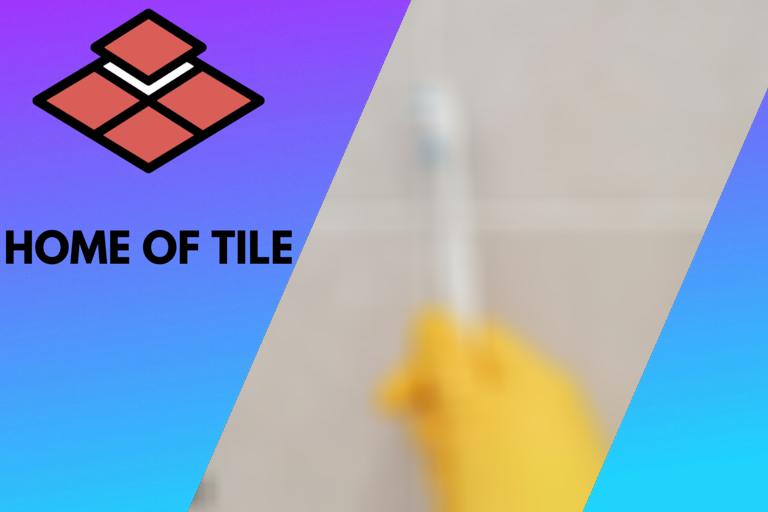How To Soften Grout for Removal. What professionals say
When you discover that the grout between your bathroom tiles is discolored, moldy, or cracking, removing it may be a good idea. Unfortunately, grout is hard to remove, and you’ll spend less time and effort if you soften it first.
You can soften grout for removal using a sugar and water solution, sulfamic acid, a lemon juice solution, or vinegar. You can also apply heat using a heat gun, a blow dryer, or a steam cleaner. Liquid grout softeners are best for the floor as they soak the grout, while heat is best for wall tiles.

Read further to discover the easiest way to remove grout and how to soften it beforehand.
Contents
How To Remove Hard Grout
Grout hardens naturally because it has an additive that keeps it from absorbing water. Electric grout removers, oscillating tools, and tile grout saws are effective, but create a lot of mess. If poorly handled, they can also damage your tiles. The best approach is to soften the grout first.
You can soften grout for removal using the following methods:
Sugar-Water Solution
When I first heard that sugared water softens grout, I was skeptical but chose to try it, and surprisingly, it works. However, you should leave the solution to soak into the grout for at least an hour.
A sugar and water solution is ideal for grout in floor tiles but you can also use it on the wall, and apply it with a soaked sponge.
- Step 1. Mix sugar and water: Add a cup (240 g/8.5 oz) of white sugar to a gallon (3.8 liters) of hot water.
- Step 1. Stir the mixture: Stir it until the sugar dissolves.
- Step 1. Apply the mixture: Generously pour the sugar solution on the grout you want to soften. If the grout is along the wall, soak a sponge and squeeze it into the grout. If the sponge grips onto the tiles, leave it to allow the water to soak the grout, even if it’s for a few minutes.
- Step 1. Wait several hours: Leave the sugar solution to soak for a couple of hours.
- Step 1. Scrape off the grout: Scrape off the grout using your preferred tool. If the grout is soft enough, you can remove it using a piece of wood, or a brush.
- Step 1. Add sugar: Add some sugar as you brush the grout until it comes off, and keep adding the sugared water as you remove the grout. This will keep it from hardening before you get it all out.
Once you have removed the grout, ensure that you clean the tiles thoroughly with soapy water, or you will be left with sticky tiles.
Vinegar and Water Solution
Vinegar contains acetic acid, making it an ideal choice for softening grout. The downside is that vinegar sometimes stains tiles, so you need to be cautious when using this method.
Before pouring generous amounts of the vinegar solution on your tiles, you should first test it on a small area to see if it will cause discoloration. If possible, choose a hidden place so the damage will not be too obvious if the vinegar ruins the tile.
You can use the vinegar solution on the grout if there is no visible change on your tiles. If you notice a difference in your tiles, you should try an alternative method.
Here’s how to use water and vinegar to soften grout:
- Step 1. Mix vinegar and water: Mix vinegar with hot water at a ratio of 1:2.
- Step 1. Apply the mixture: Pour the solution on the grout and leave it for 10 to 20 minutes.
- Step 1. Scrub the grout: Scrub out the softened grout. You can also remove the softened grout using a small piece of wood or a grout saw.
Vinegar can make your tiles dull if you use it frequently or if you do not wash it off properly. After removing the grout, rinse the tiles to remove all traces of vinegar from the titles.
Sulfamic Acid
Sulfamic acid is a potent cleaning and bleaching agent but it also softens grout effectively. You can buy it from most DIY stores or online.
If you choose this method, you should leave the sulfamic acid to soak into the grout for around five minutes.
Follow these steps to soften grout with sulfamic acid:
- Step 1. Mix sulfamic acid and water: Follow the directions when mixing sulfamic acid with warm water.
- Step 1. Apply the mixture: Apply the solution along the grout and let it sit for a few minutes. Ensure that the grout doesn’t dry out. Keep adding the solution to keep it wet until it is soft enough for you to remove it.
- Step 1. Remove the grout: Use a grout removal tool to get all the grout out.
When using sulfamic acid, focus on the grout you want to soften and remove, and avoid exposing the grout to sulfamic acid if it isn’t necessary. Some grout, such as black grout, is sensitive to sulfamic acid, and will change color and become lighter when exposed to sulfamic acid for an extended period.
This video shows a range of tools that you can use to remove grout after you have softened it.
Apply Heat With a Heat Gun, Blow Dryer, or Steam Cleaner
You can also soften grout for removal by applying heat. A heat gun or a blow dryer, under moderate heat, will soften grout within 2 to 3 minutes. Avoid using high temperatures as this could melt the grout. Besides setting the right temperature, you should also hold the tool at least 8 inches (20 cm) away from the tiles.
A steam cleaner is another piece of equipment you can use to apply heat to the grout. The advantage of a steam cleaner is that it uses heat and moisture to make the grout soft quickly. Move the nozzle along the grout until the grout is soft enough to remove with a grout saw or any other tool.
When applying dry and wet heat, you should work on small portions at a time. You will work faster, and there is no risk of the grout hardening again if you take too long working on one section.
Conclusion
You can soften grout using any of the above methods. Some, such as heat application, are faster. However, you will be more successful if you remove the grout as soon as it softens because it hardens quickly.
You would work quicker and more effectively if you removed the grout as it softened, and having the right grout removal tools at hand is also helpful.







